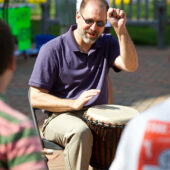Engineering professors don’t miss a beat during remote learning
 Students in Engineering 311: Control Systems and Instrumentation, are used to hands-on activities such as building circuits and sensors and using their lab bench equipment.
Students in Engineering 311: Control Systems and Instrumentation, are used to hands-on activities such as building circuits and sensors and using their lab bench equipment.Categories: Experiential Learning, Research & Discovery

 At the heart of a Wake Forest education are student-professor relationships and faculty are determined to find ways to keep connections strong no matter what form learning takes.
At the heart of a Wake Forest education are student-professor relationships and faculty are determined to find ways to keep connections strong no matter what form learning takes.  The COVID-19 pandemic has turned life as we know it upside down. But the strengthening of families, particularly father-daughter relationships, can be one silver lining from it.
The COVID-19 pandemic has turned life as we know it upside down. But the strengthening of families, particularly father-daughter relationships, can be one silver lining from it. Justin Catanoso knows one of journalism’s sacred rules is that reporters shouldn’t use friends and family members as sources.
Justin Catanoso knows one of journalism’s sacred rules is that reporters shouldn’t use friends and family members as sources. Wake Forest biology researcher Jenny Howard is using the sixth annual World Seabird Twitter Conference (#WSTC6) to spread the word about her effort to track the declining population of blue-footed boobies via social media.
Wake Forest biology researcher Jenny Howard is using the sixth annual World Seabird Twitter Conference (#WSTC6) to spread the word about her effort to track the declining population of blue-footed boobies via social media. When first-graders at Brunson Elementary were learning about birds, 17 Wake Forest students visited their classrooms to connect the biology lessons with the arts by exploring how birds move and leading bird-themed creative projects.
When first-graders at Brunson Elementary were learning about birds, 17 Wake Forest students visited their classrooms to connect the biology lessons with the arts by exploring how birds move and leading bird-themed creative projects. In mid-January, a 3-hour dance audition was held in studio D101. 50 Wake Forest students were selected by 12 student choreographers to perform in the Spring Dance Concert – a usually sold-out event held on the University’s Tedford Stage in Scales Fine Arts Center.
In mid-January, a 3-hour dance audition was held in studio D101. 50 Wake Forest students were selected by 12 student choreographers to perform in the Spring Dance Concert – a usually sold-out event held on the University’s Tedford Stage in Scales Fine Arts Center. When music professor John Beck’s Afro-Cuban drumming class moved online, his students didn’t miss a beat – even though only one of the 17 seniors in his class had access to a drum.
When music professor John Beck’s Afro-Cuban drumming class moved online, his students didn’t miss a beat – even though only one of the 17 seniors in his class had access to a drum. For an assignment from Elizabeth Clendinning’s modern popular music class, students were tasked with listening to Pink Floyd’s “Dark Side of the Moon.” The goal: to experience a concept album. The result: their families engaged, too.
For an assignment from Elizabeth Clendinning’s modern popular music class, students were tasked with listening to Pink Floyd’s “Dark Side of the Moon.” The goal: to experience a concept album. The result: their families engaged, too. The benefits of a brief “social belonging” exercise completed by black students in their first year of college followed them into adulthood, with participants reporting greater career satisfaction, well-being and community involvement almost a decade later.
The benefits of a brief “social belonging” exercise completed by black students in their first year of college followed them into adulthood, with participants reporting greater career satisfaction, well-being and community involvement almost a decade later.